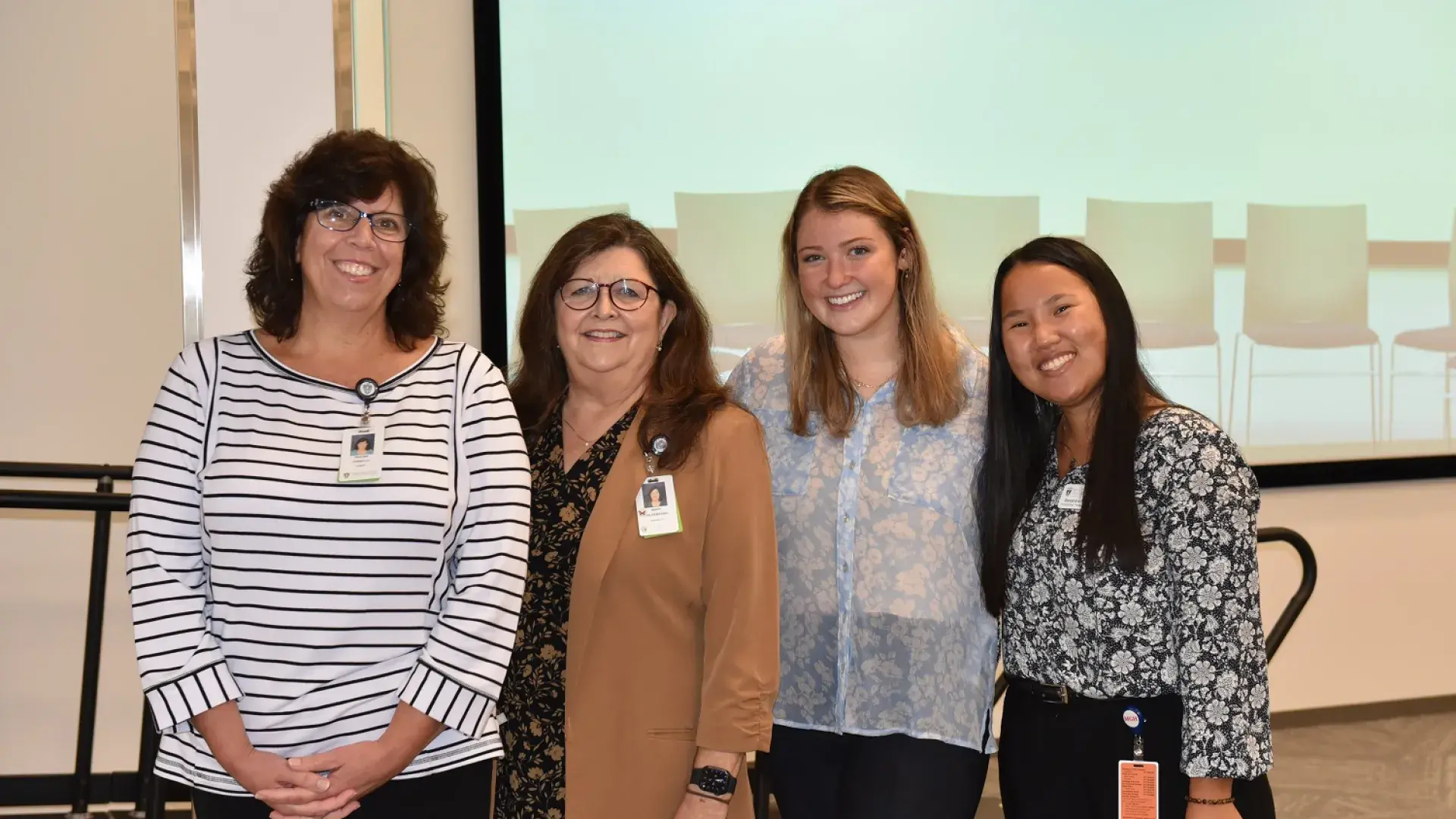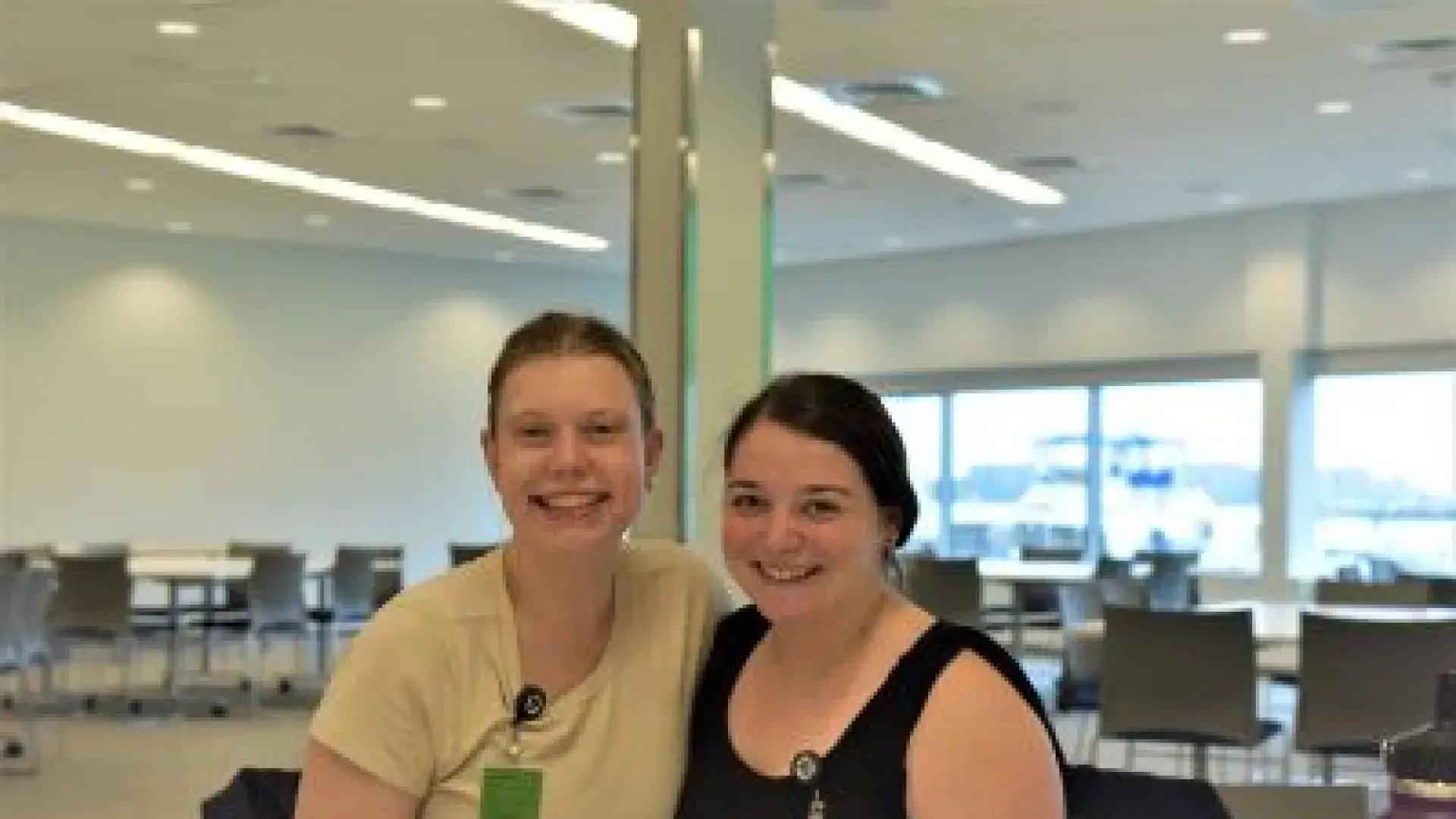
IHP students from all of the school’s direct-entry programs collaborated in client-facing, interprofessional settings as part of numerous events on campus and virtually.
Each year in the Sanders IMPACT Practice Center (IPC) at the MGH Institute, almost 500 students in seven of the school’s direct-entry programs participate in caring for clients under faculty supervision as they learn together through hands-on experiences. This interprofessional education promotes collaboration, mentorship, and teamwork while offering students ample opportunities to flex their real-world patient care skills.
Interprofessional learning, where students from multiple programs learn with and from each other, is a cornerstone of the IHP. Studies show that team-based patient care improves health outcomes and overall professional readiness, and at the Institute interprofessional learning is a cornerstone of all programs.
Child Development Day
Bringing together over 300 students, staff, and faculty from nursing, genetic counseling, occupational therapy, physical therapy, communication sciences and disorders, and physician assistant studies programs, Child Development Day is an annual interprofessional learning activity in which students learn about typical child development.
To put what they’ve learned through their courses into the real world, students interact with children and their caregivers and conduct interprofessional developmental assessments. Held virtually this year on October 21, the day allowed students to interact with and observe the children in their homes, offering an even clearer lens into their wellness. 30 families – including child and caregiver – participated in the event.
Jennifer Mackey, Director of Clinical Education and Assistant Professor in the Department of Communication Sciences and Disorders at the IHP, played a critical role in organizing the event.
“Child Development Day is an incredible opportunity for students to get a holistic view of a child and their family,” she shared. “Students see beyond their own discipline and learn to collaborate as a team. They see the child in their natural environment, which provides a unique insight into development.”
Shoshana Weiner, DPT ’24, who is interested in specializing in pediatric physical therapy clinical practice found the opportunity particularly interactive and impactful.
“It provided a constructive and safe environment to engage with my peers, the faculty, and families while conducting a session for a pediatric client,” she said. “The learning experience helped me develop my communication skills and my ability to collaborate across professions and with caregivers. I’m glad I was given this introduction to working with infants and their families.”
Grand Rounds
A client who recently graduated from the Spaulding-IHP's Comprehensive Aphasia Program (S-IHP's CAP) and his caregiver took the stage on October 26 to share his story. He’s been diagnosed with aphasia, a language disorder caused by damage to the brain, often from a stroke or brain injury, that affects speaking, listening, reading, and writing, and at times, right hemiparesis, or muscle weakness on the right side. The discussion brought to light his needs and strengths, as well as the unique challenges of post-stroke rehabilitation and recovery.
Students and faculty from the CSD, OT, and PT programs spoke as well, giving details about their work with the client and each of their roles in his recovery through the lens of the Life Participation Approach to Aphasia (LPAA), which is a clinical philosophy focused on helping individuals with aphasia achieve and/or reconnect with their life by focusing on the goals that are important to them.
Esther Ayuk, an Instructor in the Department of Communication Sciences and Disorders and Coordinator of the school’s Aphasia Center who leads the S-IHP’s CAP program at the Institute and facilitated the Grand Rounds event, is driven to do so by the inherent value this talk offers students.
“It’s a great experiential learning opportunity, encouraging students to zoom out and examine their role and responsibilities as part of a care team,” she shared. “They learn what it takes to make informed, collaborative decisions. They also get to understand the impact of their coordinated efforts first-hand from the people they serve.”
First-year DPT student Grace Lambright, who sat in the audience, found it interesting to see the interprofessional angle that the care team took working with the client.
“A lot of the time we hear how similar PT and OT, and even speech, are, but in this discussion we were able to see how different they truly are, but how critical it is that they are integrated,” Lambright said.
Miranda Milunsky, another first year DPT student, also shared her thoughts.
“This client’s case really emphasized the need for clinicians to share information and goals across professions to offer integrated care,” she said. “You need to be able to communicate effectively with a client in order to successfully support them through physical therapy, which requires collaboration with the SLPs and OTs on board to learn how the client communicates best.”
The client’s mother was also outspoken, discussing the care her son has received at both Spaulding and the IHP, and reiterating the impact the students, faculty, and clinicians have had on his recovery. As her son now resides in a temporary housing situation while he awaits more permanent housing, she has seen firsthand the shortage of specialists that exists elsewhere, and the challenge that this creates, making her even more grateful for the IHP’s services.
“Please know that the services out there don’t measure up, and it's not anywhere else but here that I've seen such dedication,” she shared. “He’s been in the outside and there's nothing there. So I'm very pleased and proud that he's been able to take advantage of all that you have to offer. Truly, I am grateful. And he's come so far with all of you people.”
Interprofessional Screenings
In October and November, many nursing, PT, OT, and CSD students worked with clients as part of the Institute’s annual Interprofessional Neurologic Screenings. In collaboration across specialties, the students interacted via Zoom with clients who have aphasia to perform neurological screenings, formulate goals, and suggest supportive treatment.
“It’s one of the first opportunities our nursing students have to work with patients with aphasia,” said Jason Lucey, Assistant Dean of Advanced Practice and Programs in the School of Nursing. “It’s really a chance for them to hone their interprofessional teamwork skills. Each discipline may have different goals they are working towards in one single session. The challenge is doing that together."

